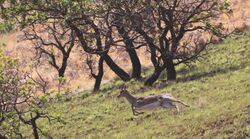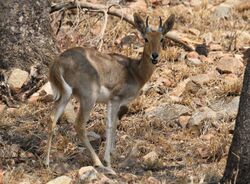Biology:Mountain reedbuck
| Mountain reedbuck | |
|---|---|
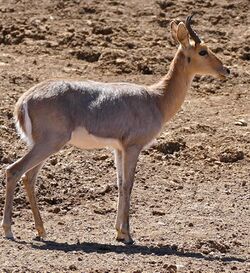
| |
| Male | |
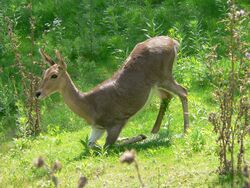
| |
| Female | |
| Scientific classification | |
| Domain: | Eukaryota |
| Kingdom: | Animalia |
| Phylum: | Chordata |
| Class: | Mammalia |
| Order: | Artiodactyla |
| Family: | Bovidae |
| Genus: | Redunca |
| Species: | R. fulvorufula
|
| Binomial name | |
| Redunca fulvorufula (Afzelius, 1815)
| |
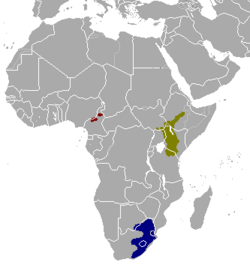
| |
Western mountain reedbuck
Chanler's mountain reedbuck
Southern mountain reedbuck
| |
The mountain reedbuck (Redunca fulvorufula) is an antelope found in mountainous areas of much of sub-Saharan Africa.
Subspecies
There are three recognized subspecies.
- Redunca fulvorufula adamauae - Adamawa mountain reedbuck
- Redunca fulvorufula chanleri - Chanler's mountain reedbuck (named for William A. Chanler)
- Redunca fulvorufula fulvorufula - southern mountain reedbuck
Description
The mountain reedbuck averages 75 cm (30 in) at the shoulder, and weighs around 30 kg (66 lb). It has a grey coat with a white underbelly and reddish-brown head and shoulders. The male has ridged horns of around 15.2 cm (6.0 in), which curve forwards. Both sexes have a dark scent patch beneath the ears.[2]
Distribution and habitat
The mountain reedbuck occurs in three separate geographic areas, each containing a separate subspecies. The southern mountain reedbucks inhabits an area from the eastern Cape Province (South Africa ) to southeastern Botswana. Chanler's mountain reedbuck occurs in Tanzania, Kenya, Uganda, Sudan, and Ethiopia. The Adamawa mountain reedbuck is only been found at the Nigeria-Cameroon border.[3][4] The species occupies ridges and hillsides in rocky country and high-altitude grasslands (often with some tree or bush cover), at altitudes of 1,500-5,000 m.[1][2]
Current total population of all subspecies has been estimated at some 36,000 individuals.[1]
Ecology
File:Mountain Reedbuck (Redunca fulvorufula) (W1CDR0001145 BD24).ogg Mountain reedbucks are predominantly grazers, and water is an important habitat requirement. They tend to feed in the early evening and morning hours, normally in small groups of six or fewer animals. A typical group is made up of one adult male and several adult females and juveniles. Adolescent males are forced out of their herds and form small bachelor herds. Lifespan in the wild is unknown, but specimens of related species in captivity have been recorded to live up to 18 years.[2]
The mountain reedbuck is subject to some pressure from hunting and human encroachment on its habitat, and current populations appear to be declining. This species is classified as Endangered by the IUCN.[1]
References
- ↑ 1.0 1.1 1.2 1.3 IUCN SSC Antelope Specialist Group (2017). "Redunca fulvorufula". IUCN Red List of Threatened Species 2017: e.T19391A50193881. doi:10.2305/IUCN.UK.2017-2.RLTS.T19391A50193881.en. https://www.iucnredlist.org/species/19391/50193881. Retrieved 18 November 2021.
- ↑ 2.0 2.1 2.2 Steinke, Ashly. "Redunca fulvorufula - mountain reedbuck". Animal Diversity Web. http://animaldiversity.org/accounts/Redunca_fulvorufula/.
- ↑ East (compiler), R. (1999). African Antelope Database 1998. Gland, Switzerland and Cambridge, UK: IUCN.
- ↑ Avenant, N.L. (2013). "Redunca fulvorufula Mountain Reedbuck". in Kingdon, J. and Hoffmann, M.. The Mammals of Africa. 6. Pigs, Hippopotanuses, Chevrotain, Giraffes, Deer, and Bovids. London, UK: Bloomsbury Publishing. pp. 422–426.
Wikidata ☰ Q820184 entry
 |

